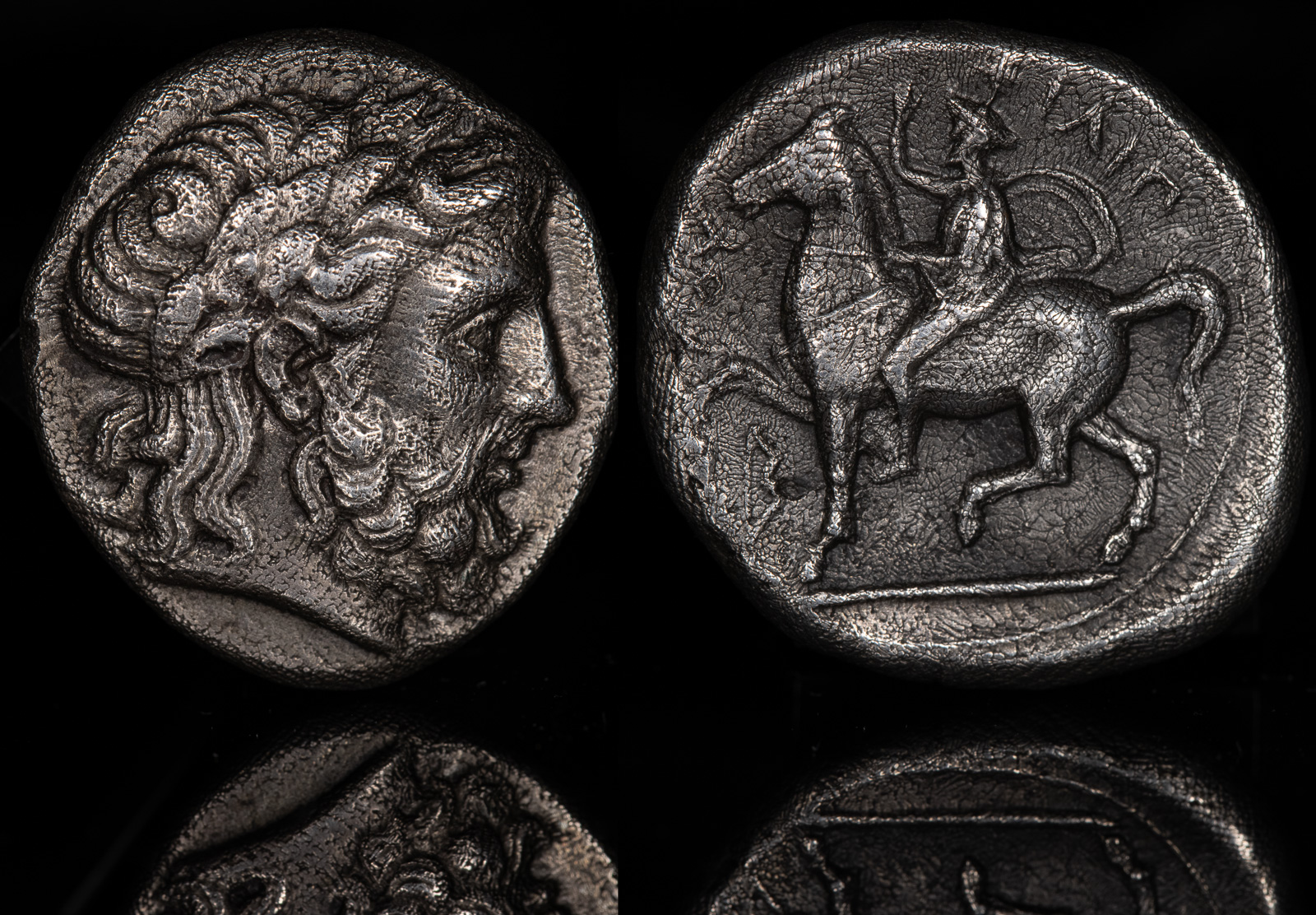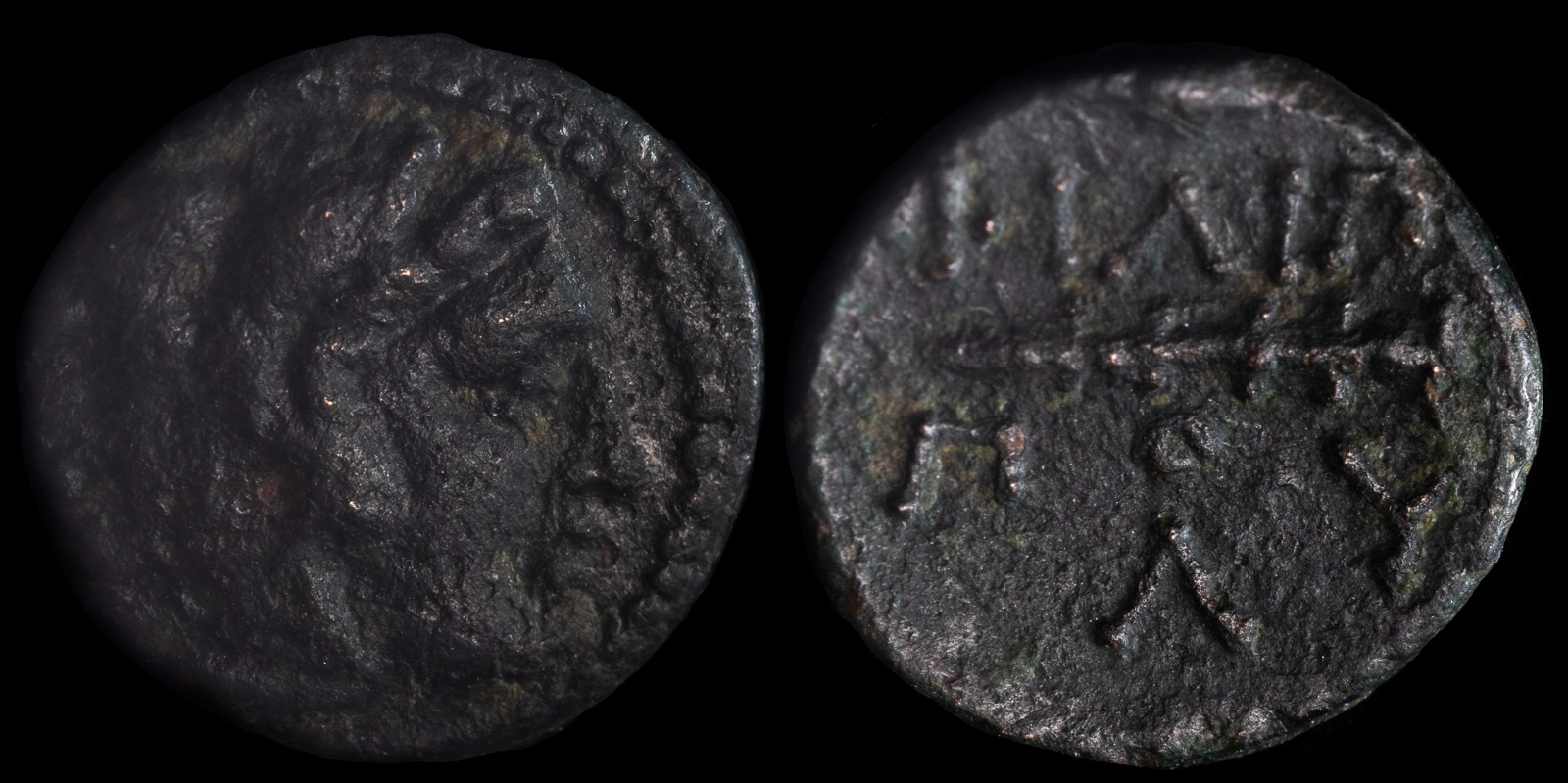
Macedonian Kingdom, Philip II AR Tetradrachm.
Pella mint, ca 354-349 BCE
22-24 mm., 13.68g.
Laureate head of Zeus right / ΦIΛΛIΠOY, Philip II, diademed & in kausia, on horseback left, raising right hand
Wow. Philip II. What can I say about the guy who really started it all? Even during the time of Alexander the Great there was a debate about who truly setup Macedon to take down Darius III and the Achaemenid Empire. After all, the military techniques and top generals were all put in place by Philip, and then utilized by Alexander.
Personally, I’m not a fan of that argument. One huge reason why Alexander was so successful was his bravery. He was always in the front of every battle, leading his soldiers to victory. Philip II was more of an orchestrator, and he even suffered a few defeats.
There’s also some debate that Alexander arranged to have his father assassinated. At the very least, his mother Olympias wasn’t upset at her husband’s death. She erected a monument to his killer. The assassin was also eliminated before he had any chance to name any co-conspirators.
The history of Philip II’s rise constitutes the first third of my set “Philip II, Alexander III, and the Era of the Diadochi.” While his son was an esteemed general and knew how to inspire his soldiers, Philip was more of a politician. He knew what was possible politically and what wasn’t, and was adept at playing sides off each other.
Philip II made strong use of this skill during his reign. He played off Athens to conquer and keep Amphipolis. He did it again to conquer the Chalkidian League. He also pitted Kersebleptes and Amatokos II against each other and Athens in order to occupy Thrace. Finally, he made use of the Sacred War to become the strongest entity in Greece.
While Alexander took Macedon to heights never imaginable, Philip did setup the groundwork. Without Philip there would have been no Alexandrian empire, and the world would be a very different place.

Kings of Macedon. Uncertain mint. Philip II of Macedon
359-336 BCE
Æ 11mm, 1,01g
Head of Herakles right, wearing lion’s skin headdress /
ΦΙΛΛΙΠΟΥ, club, [spear head above], Λ below.
SNG ANS 984; SNG Alpha Bank 440
Philip II is born in Pella to Eurydike I and Amyntas III.
Theopompos, a historian credited with the most complete history of Philip II, is born on Chios.
The Theban general Pelopidas intervenes in Macedonian affairs, leading an expedition to secure Alexander II‘s position. However, Alexander is forced to agree to a treaty that acknowledges Theban influence and sends his brother Philip II to Thebes as a hostage.
Philip II returns to Macedon from Thebes.
Marriage of Phila, daughter of Derdas II, to Philip II.
Marriage of Audata to Philip II.
Philip II bribes Paeonia (either Lykkeios or his predecessor Agis) to avoid an invasion of Macedonia.
Philip II takes Macedonia from his nephew Amyntas IV and declares himself king. Amyntas IV is spared.
Philip II defeats a force of 3000 Athenian hoplites promoting a pretender Argaios II.
The Paeonians under Lykkeios are defeated by Philip II.
Marriage of Philinna, from Larissa, to Philip II.
Philip II undertakes a campaign to subjugate the Chalkidike Peninsula, including Aineia.
Philip II of Macedon conquers Amphipolis.
Kersebleptes, in a bid against Philip II, turns over all the cities of the Chersonese to Athens except for Kardia.
Birth of daughter Kynane to Audata and Philip II.
Marriage of Olympias to Philip II.
Birth of Philip III to Philinna and Philip II.
Philip II defeats the Illyrians.
Philip II takes Pydna. He is supposed to give up Amphipolis to Athens in exchange, but ends up keeping both cities.
Ketriporis enters an alliance with Athens, the Illyrians, and the Paeonians (probably under Lykkeios) against Philip II.
Philip II occupies Krenides and renames it to Philippi.
Potidaia is occupied by Philip II.
The Athamanians join Philip II in the Third Sacred War against Phokis.
Approximate year when Ketriporis is subjugated by Philip II.
Artabazos II enlists the help of Thebes, but he is defeated by forces under Artaxerxes III Okhos. Artabazos flees to the court of Philip II.
Approximate birth of Kleopatra to Olympias and Philip II.
Philip II besieges Methone. He takes the city but loses an eye in the process.
Kersebleptes and Philip II plan joint action against Amatokos II. The agreement breaks down, and Kersebleptes allies with Athens and attacks Amatokos II himself.
Philip II defeats Lykophron of Pherai, who had been supported by Onomarchos.
Philip II attacks and defeats Kersebleptes due to his attack on Amatokos II, who disappears from sources. Teres II seems to take over.
Alexander I Molossos brought to Macedon under Philip II for his protection.
Philip II besieges and takes Pharkadon.
Philip II conquers Olynthos and thus destroys the Chalkidian League.
Teres II allies with Philip II against Kersebleptes and keeps his throne.
Parmenion, a general of Philip II, destroys Halos during the Third Sacred War.
Kardia signs and agreement with Philip II.
When Philip II marches against Kersebleptes, Athenian troops under Chares are sent against Macedonia. However, they soon disappear and Athens has no idea what happened to them.
Philip II hands over Orchomenos and Koroneia to Thebes.
Lilaia is destroyed by Philip II during the Third Sacred War.
Approximate marriage of Nikesipolis, maybe the nice of Jason of Pherai, to Philip II.
Birth of daughter Thessalonika to Nikesipolis and Philip II. Nikesipolis dies a few days later.
Philip II is severely wounded in the leg in a campaign against the Ardiaioi.
Philip II annexes Larissa into Macedonia.
Knossos is an ally of Philip II of Macedonia.
Antipater is selected by Philip II to govern Macedonia while he is on campaign.
Philip II grants Apollonides governing power in Kardia.
Marriage of Meda, a Thracian princess, to Philip II.
Philip II leads a campaign against the Skythians.
Kabyle conquered by Philip II.
Philip II undertakes a campaign against Thrace and presumably ousts Kersebleptes and Teres II.
Alexander drives the Maedi tribe from Macedonian territory while his father Philip II wages a campaign against the Thracians.
Philip II besieges Perinthos. It is believed this is the battle where Antigonos Monophthalmos loses an eye.
Samothrace is incorporated into Macedon by Philip II.
Philip II with Alexander III enters Phokis and seizes Elataia, then improves its fortifications.
Kallatis taken by Macedonia under Philip II.
Memnon of Rhodes aids Byzantion in withholding a siege by Philip II.
Philip II unsuccessfully besieges Odessos.
The Aetolian League receives Naopaktos from Philip II.
Marriage of Kleopatra Eurydike to Philip II. The marriage is seen as a direct insult to Alexander III.
Alexander the Great flees Macedon after his father Philip II marries a woman whose heir could be a threat to his throne.
Olympias flees from her husband Philip II and attempts to persuade her brother, Alexander I Molossos, to attack Macedon. Alexander instead decides to seal a marriage alliance with Philip for Kleopatra.
Aristotle moves from the court of Philip II, where he was the tutor to Alexander III, to Mytilene, where his friend Theophrastos lives.
Pixodaros offers his daughter to Philip III Arrhidaios. Alexander the Great offers his hand instead and when Philip II hears about the matter, he calls it off.
Abydos besieged by the Macedonian general Parmenion under Philip II.
The Aetolian League, Athens, and Thebes revolt against Macedon after the death of Philip II.
Philip II sends Parmenion, Attalos, Amyntas, and Kalas to the Troad to prepare for an invasion. They are defeated by Memnon of Rhodes.
Laomedon, Harpalos, Nearchos, and Ptolemy are exiled by Philip II due to their involvement in the Pixodaros affair with Alexander III.
The Philippeion is constructed by either Philip II or Alexander III (then later) at Olympia.
October 25
Alexander the Great becomes King of Macedon when his father, Philip II, is murdered at the wedding of his sister Kleopatra and Alexander I Molossos. Perdikkas helps chase down and kill the assassin.